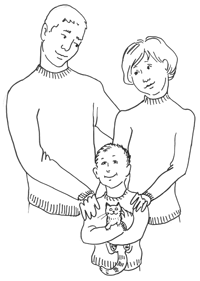STRANGE BUT TRUE- Romantic love: Think of the evolutionary possibilities!

DRAWING BY DEBORAH DERR McCLINTOCK
Q. "I'm stone in love with you," crooned the Stylistics. "Love is a drug, and I need to score," intoned Bryan Ferry. If music comes close to the metaphoric love "drug," what are a few of love's more literal effects?–G. Casanova
A. In the early stages of a relationship, huge releases of oxytocin (the "trust" hormone) and feel-good hormones like dopamine and norepinephrine are at such high levels they could be regarded as inducing clinically verifiable altered states of consciousness, says Daniel Levitin in The World in Six Songs. Our heart rate speeds up when we think about our loved one, impelling us to make resolutions about losing weight or exercising more and filling us with a giddy optimism.
At the core of romantic love is the ability to form a strong partnership with another person, with its clear evolutionary advantages: children and their upbringing. "Nowhere in your lineage, no matter how many thousands of years you go back, will you find an ancestor who failed to have children and whose kids didn't receive at least the care necessary to grow up and successfully reproduce."
That's the love drug over the generations and worth more than a song or two.
Q. A family on a summer trip to Ushuaia in Patagonia, Argentina, was surprised to discover no ants whatsoever. Are there places on Earth where the "anthill mob" rarely congregates?–A. Ant
A. Ushuaia is one of the few land locales where ants do not occur naturally, although adventive species– non- native and non-established– may survive in houses, Harvard's Edward O. Wilson told New Scientist magazine. It's just too cold and wet there. Other antless places would be Antarctica, the sub-Antarctic islands (though an adventive species was found once in an abandoned whaler's hut on Kerguelen), the Falkland Islands, the high Arctic, Iceland, and the upper slopes of high mountains.
Q. Most of us would have trouble getting through a typical day without checking this out, though a banker has a different view of it than a racecar driver, and both of them have very different views from Albert Einstein. It's all around us, imposing order on the sequence of life's happenings. According to researchers at the Random House Dictionary, it's the single most-used noun in the English language.–H. Luce
A. No, it's neither love nor money nor food nor faith. It's time, and we thank you for taking a bit of yours to puzzle this one out. (From "What If Time Really Exists?" by Sean M. Carroll)
Q. On the drive to work, what surprising thing might you do to help speed other motorists along to their jobs on time?–R. Petty
A. Talk on your cell phone. Just as an airplane passes from one air traffic control tower to another, a cell phone is handed off from one communication tower to the next as it moves throughout a city's cells, says Bob Hirshon of the American Association for the Advancement of Science. Since the phones each have unique identifiers, computers can track the movement of a particular phone and gauge its speed through traffic. And by tracking thousands of cell phones simultaneously, the system can spot traffic jams on major arteries.
Bill Knee of the National Transportation Research Center says this may even help local police identify possible accidents where traffic seems to be flowing fine in a particular area but then suddenly stops.
For the system to work, the phones don't even have to be in use, just turned on. And it'll do all these things without knowing who each cell phone belongs to or eavesdropping on people's conversations. Says Hirson, "This system demonstrates the power of piggybacking onto existing technologies to accomplish a new task."
Q. In the b.o. department, are there people who think they stink but nobody else thinks they do?–P. Pen
A. "Fetor soma," or body odor, may be real or imagined, either concerning the whole body or specific body areas or orifices, report Suresh Bhatt and Robert Henkin in the Journal of the American Medical Association. In the case of olfactory hallucinations, which are not uncommon, these may stem from psychiatric disorders or epilepsy (difficult to treat), or from olfactory receptor hypersensitivity (medicines often help).
In some instances, the phantom odors seem to be issuing not from oneself but from someone nearby, with even thornier social consequences.
~
Send strange questions to brothers Bill and Rich at [email protected].
#